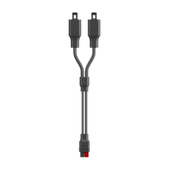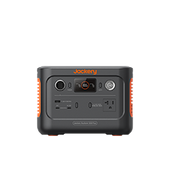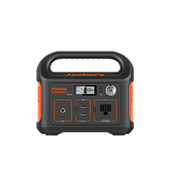Microwaves are an essential kitchen appliance used for heating foods, cooking, or baking. It's a handy gadget that gets the work done much faster and without creating any mess. However, there is a wide range of microwaves available that consume high energy. But how to find microwave wattage? Typically, microwaves consume around 600-1200W of electricity, depending on their size and type.
Popular battery backups like Jackery Solar Generator 2000 v2, Jackery Solar Generator 2000 Plus, and Jackery Solar Generator 3000 Pro are designed to charge most of your home or outdoor electrical gadgets. They have reasonable wattage and compact size, so you can quickly move them around and power appliances. Whether you're powering a low-power-consuming microwave or a higher one, Jackery Solar Generators have your back.
Microwave Wattage Key Takeaways
Before we dive deep into how to find microwave wattage, here are a few key takeaways to consider.
- The microwave wattage typically indicates the cooking power of the appliance.
- The higher the wattage, the more energy or power will be supplied to cook the food.
- The smaller microwaves consume 600W, the standard ones consume 800-1000W, and the commercial microwaves draw 1000-1200W.
- If you are using a microwave for 15 minutes every day, it draws 6.1kWh of electricity every month and 73kWh per year.
How to Find The Microwave Wattage?
The simple way to find the microwave wattage is by checking the user manual. If you do not have a microwave's user manual, you can look for the serial number plate inside the appliance. Generally, the wattage is listed there. If nothing works, consider testing the wattage on your own.
In order to find the approximation of the microwave's wattage, all you need to do is fill the microwave-safe liquid measuring cup with one cup of cold water. Now, keep an eye on the microwave and note down how much time it takes for the water to boil.
For example, if it takes two and a half minutes, the microwave consumes 1200 watts. If it takes 2 minutes, the microwave draws 1000 watts. Similarly, an 800W microwave will take two and a half minutes, and a 700W microwave will take three minutes.
In addition, the microwave's function also affects the wattage. The more functions it can perform, the higher the microwave wattage consumption.
|
Microwave Wattage |
Function |
|
600-800W |
Reheat |
|
800-1000W |
Cook, reheat, crisp, defrost |
|
1000-1200W |
Cook, reheat, crisp, defrost, air fry, convection, roast, broil, bake, grill, steam |
How Many Watts Does A Microwave Use?
Microwaves are available in different sizes and power ratings. Small and compact microwaves consume around 600-800W, standard-size microwaves draw 800-1000W, and larger ones use more than 1000W. The higher the microwave wattage, the faster it will cook or heat food. The highest microwave wattage can go up to 1700W and is typically used in restaurants.
If you want to calculate the wattage consumption of the microwave, you'll check the appliance size, wattage, and daily usage. Here, how much energy the microwave uses can be calculated using the formula below:
Total Energy Use = Time Used × Input Wattage
- Time used defines the amount of time you use the microwave every day.
- Input wattage is the amount of wattage used by a microwave to perform work.
- Total energy use is the microwave's daily energy consumption.
Here's a table revealing the microwave wattage, hours per year run, and the yearly kilowatt-hour consumption of electricity.
|
Microwave Wattage |
Hours Per Year Run |
Yearly kWh Of Electricity |
|
600 W |
91.3 |
54.8 kWh |
|
650 W |
91.3 |
59.3 kWh |
|
700 W |
91.3 |
63.9 kWh |
|
750 W |
91.3 |
68.5 kWh |
|
800 W |
91.3 |
73.0 kWh |
|
850 W |
91.3 |
77.6 kWh |
|
900 W |
91.3 |
82.2 kWh |
|
950 W |
91.3 |
86.9 kWh |
|
1,000 W |
91.3 |
91.3 kWh |
How Much Does It Cost to Power A Microwave?
The cost of using microwaves depends on the utility provider and the electricity rate of your location. If you want to calculate the costs to run a microwave, multiply the microwave's energy consumption (kWh) with the electricity rate of your area.
If the electricity rate in your area is around $0.30 per kWh, the cost of running the microwave (for around 15 minutes) will be:
10kWh × $0.30 per kWh = $0.030
If you are using a microwave daily and for each year, you will spend $10.95 on energy costs.
The following table reveals the monthly and yearly costs of running a microwave by state.
|
State |
Average Electricity Rate |
Cost Per Month |
Cost Per Year |
|
California |
22.00 ¢ / kWh |
$1.34 |
$16.06 |
|
New York |
20.59 ¢ / kWh |
$1.25 |
$15.03 |
|
Texas |
12.56 ¢ / kWh |
$0.76 |
$9.17 |
|
Massachusetts |
22.59 ¢ / kWh |
$1.37 |
$16.49 |
|
Florida |
12.21 ¢ / kWh |
$0.74 |
$8.91 |
|
Virginia |
12.58 ¢ / kWh |
$0.77 |
$9.18 |
|
New Jersey |
16.20 ¢ / kWh |
$0.99 |
$11.83 |
|
Maryland |
14.48 ¢ / kWh |
$0.88 |
$10.57 |
|
Washington |
10.38 ¢ / kWh |
$0.63 |
$7.58 |
|
US Average |
14.19 ¢ / kWh |
$0.86 |
$10.36 |
Jackery Solar Generators for Microwaves
Jackery Solar Generators consist of Jackery Explorer Portable Power Stations and Jackery SolarSaga Solar Panels to charge different types of electrical appliances. Investing in a solar-powered generator for the microwave helps you keep the device charged when the electricity grid is down, or you are away from the electrical outlet.
It starts working when the direct sunlight falls on the monocrystalline silicon cells of Jackery SolarSaga Solar Panels and gets converted to DC electricity. Then, the Jackery Explorer Portable Power Stations converts the DC to AC electricity to power microwaves and other appliances.
Jackery Solar Generator 3000 Pro
The Jackery Solar Generator 3000 Pro comes with an NMC battery of 3024Wh to charge even high-end microwaves. This home battery backup solution can charge 99% of home or outdoor appliances. You can recharge the power station in only 3.5 hours using 6*Jackery SolarSaga 200W Solar Panels. The solar-powered generator can keep a high-end microwave (1200W) powered for 2.0 hours.

Customer Review
"Ordered for rolling blackouts this winter, so we can use the electric throws that we purchased for heat and some lights and the coffee pot or microwave! Tested electric throws on high for 1.5 hours; the power was down to 89%, so this should work well!" — Lee Howze.
Jackery Solar Generator 2000 Plus
The Jackery Solar Generator 2000 Plus has a stable and powerful LiFePO4 battery of 2042.8Wh capacity and can even be expanded to 24kWh with an additional Jackery Battery Pack 2000 Plus. This solar generator can charge 99% of home or outdoor appliances like microwaves. If you are powering a high-end 1200W microwave, the solar generator can supply steady electricity for 1.3 hours.

Customer Review
"We love this power station; it can be recharged quickly. No noise while enjoying the peace and quiet at the off-grid cabin. Runs our fridge/freezer for about a day and a half, and that is with running lights and other things at the same time." — L Mc.
Jackery Solar Generator 2000 v2
The Jackery Solar Generator 2000 v2 is 40% smaller and 34% lighter than other similar-capacity products available in the market, making it ideal for outdoor adventures. The quiet, eco-friendly charging solution can charge 99% of household appliances, ensuring comfort during power outages or blackouts. It offers UPS (Uninterrupted Power Supply) support for seamless power backup for essential appliances, such as refrigerators, computers, and microwaves, during power outages.

Customer Review
“Never thought it would work so well. Just had it up at my camp for a week. It’s off the grid. Only used my generator once to charge up the Jackery from 1 percent to 100 percent in one and a half hours. Love it. Good job, Jackery!” — Martin.
|
|
600-800W Microwave Working Hours |
800-1000W Microwave Working Hours |
1000-1200W Microwave Working Hours |
|
3.0-4.0H |
2.4-3.0H |
2.0-2.4H |
|
|
2.0-2.7H |
1.6-2.0H |
1.3-1.6H |
|
|
2.0-2.7H |
1.6-2.0H |
1.3-1.6H |
Please note that the working hours of the appliances calculated in the above table are just for your reference and may vary from the actual values.
What Microwave Wattage Do You Need?
The right microwave wattage will depend on how you plan to use the appliance to make meals. For example, smaller microwaves consuming 600-800W can handle small meal preparation, whereas higher-wattage microwaves are excellent choices for large, complex meals. Here, we will compare different microwave wattages and their usages.
|
|
Usage |
Pro |
Cons |
|
700W Microwave |
It is ideal for small meal preparation tasks, such as warming up drinks, cooking frozen meals, or reheating leftovers. |
● This microwave is compact and lightweight. ● It consumes less energy. |
● They may take longer to heat your food. |
|
700-1000W Microwave |
These microwaves come with additional features like cooking, defrosting, and reheating. |
● It is known for consistent cooking results and versatility. ● This is perfect for home usage. |
● They draw more power than compact microwaves. |
|
Over 1000W Microwave |
The high-end microwaves can air fry, bake, grill, steam, broil, and roast foods. |
● These microwaves require more power and are ideal for large, complex meals. |
● The high-end microwaves are heavy. |
How to Find Microwave Wattage FAQs
What is 700W in microwave?
A 700W microwave is considered to be medium power. Microwave power levels are typically categorized as low, medium, and high — and 700W falls within the medium range.
What factors affect the microwave wattage?
Like any other appliance, the microwave draws energy that contributes to the electricity bills. If you're wondering how to find the microwave wattage, there are several internal and external factors that influence microwave energy consumption, including size, usage, and age. If you use a larger microwave for long hours, it will consume more power.
How many watts is my microwave input or output?
The microwave's input wattage is the amount of power it uses to generate microwave energy. On the other hand, the output wattage varies depending on the model. The larger microwaves typically consume more power than the smaller ones. Likewise, the input wattage generally is greater than the output wattage.
How do you measure microwave output?
If you want to measure the microwave output, all you need to do is run the microwave in power-only mode and then use the temperature probe for temperature readout. You can even use a handheld thermostat to measure the microwave output.
Does a higher-wattage microwave use more electricity?
The higher the microwave wattage, the greater the amount of electrical energy the appliance will use over a period of time. For example, a 1000-watt microwave will consume twice as much energy in an hour as a 500-watt microwave.
Final Thoughts
There's no doubt that microwaves are essential kitchen appliances that can help you cook indoors or outdoors without mess. However, it is critical to choose the right size of a microwave that will meet your needs and preferences. Then, you can solve the "how to find microwave wattage" query using the simple formula. Jackery Solar Generators are powerful enough to charge all appliances, including microwaves. It can be carried anywhere, so all your appliances can stay powered.









































































































![How Many Watts Does A Microwave Use [With Data Table]](http://www.jackery.com/cdn/shop/articles/how_to_find_microwave_wattage_by_jackery_0cbf3074-07d6-4b46-83a5-c9d355ca9d4c.jpg?v=1740122948)







Leave a comment